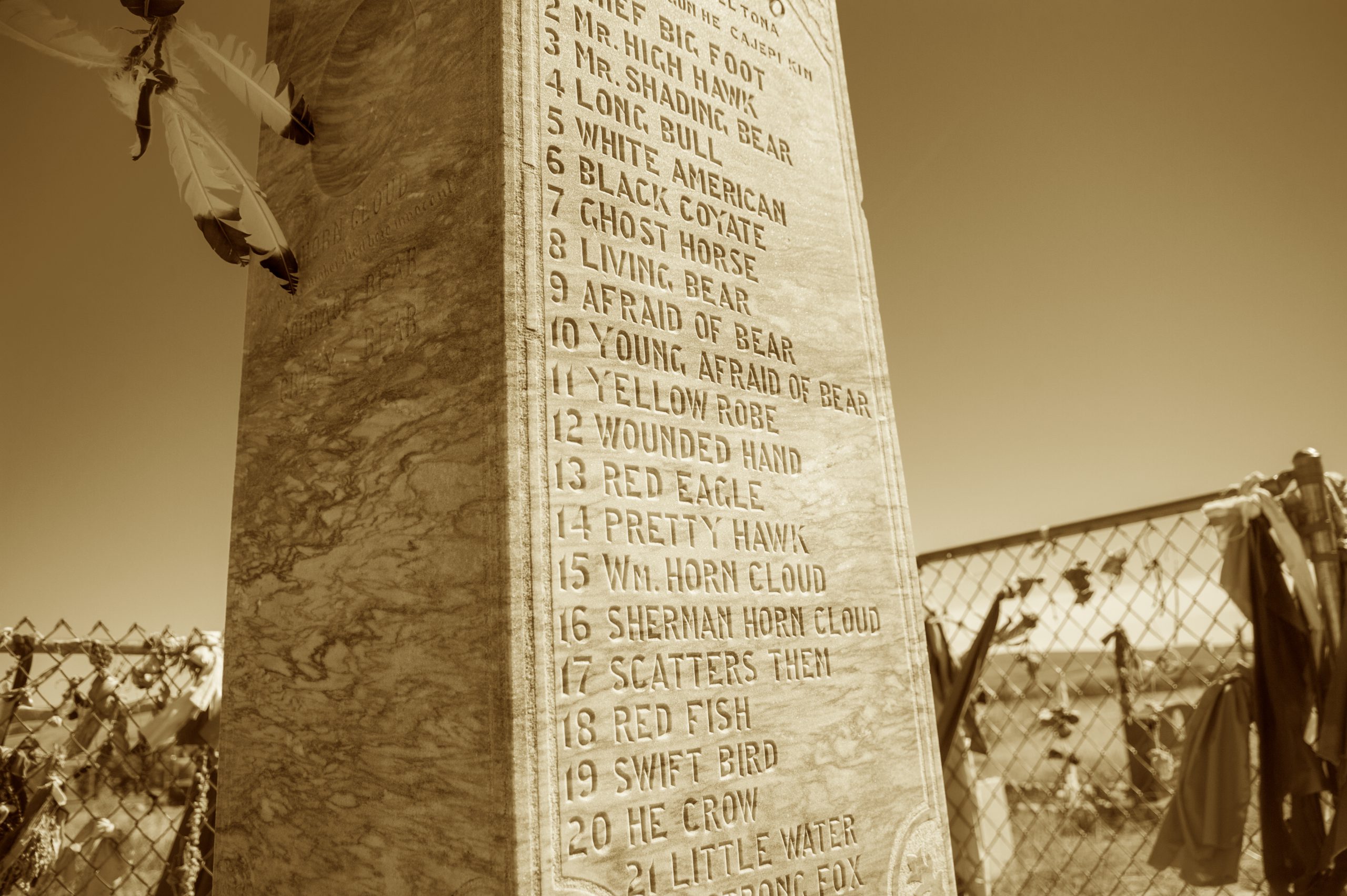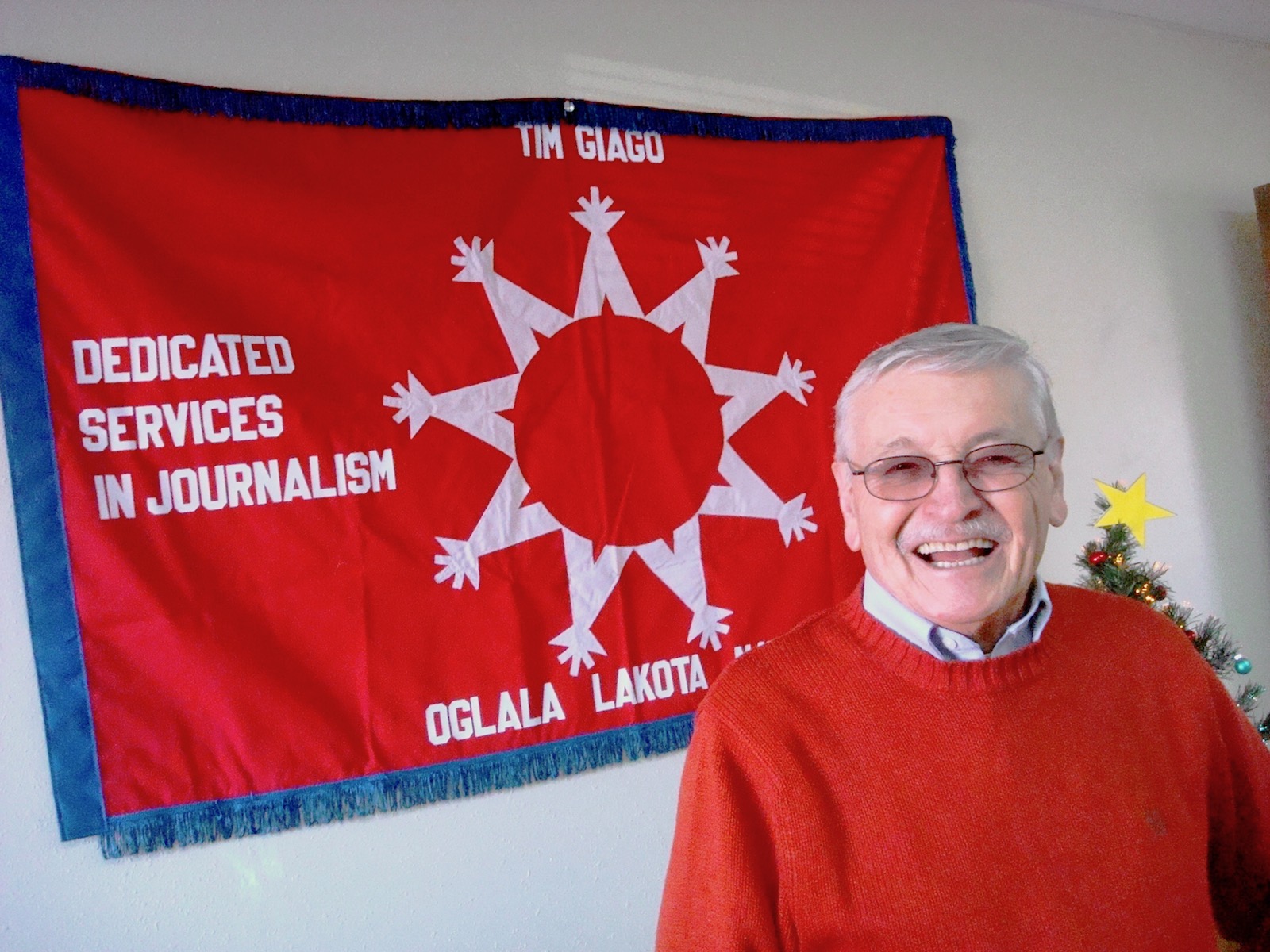Indianz.Com > News > Tim Giago: Will America ever own up to its sins at Wounded Knee?

Notes from Indian Country
The Moon of the Popping Trees
Monday, December 21, 2020
Tim Giago wrote this column originally in 2013. He revives it to commemorate the Wounded Knee Massacre every December.
WOUNDED KNEE— On crystal clear nights when winter winds whistle through the hills and canyons around Wounded Knee Creek, the Lakota elders say it is so cold that you can hear the twigs snapping in the frigid air.
They called this time of the year, “The Moon of the Popping Trees.” It was on such a winter morning on December 29, 1890 that the crack of a single rifle brought a day of infamy that still lives in the hearts and minds of the Lakota people.
After the rifle spoke there was a pause and then the rifles and Hotchkiss guns of the Seventh Cavalry opened up on the men, women and children camped at Wounded Knee. What followed was utter chaos and madness. The thirst for the blood of the Lakota took away all common sense from the soldiers.
The unarmed Lakota fought back with bare hands. The warriors shouted to their wives, their elders and their children, “run for cover,” Iyankapo! Iyankapo!
Elderly men and women, unable to fight back, stood defiantly and sang their death songs before falling to the hail of bullets. The number of Lakota people murdered that day is still unknown. The mass grave at Wounded Knee holds the bodies of 150 men, women and children. Many other victims died from their wounds and from exposure over the next several days. The Lakota people say that only 50 people out of the original 350 followers of Sitanka (Big Foot) survived the massacre. Five days after the slaughter of the innocents an editorial in the Aberdeen (S.D.) Saturday Pioneer reflected the popular opinion of the wasicu (white people) of that day. It read, “The Pioneer has before declared that our only safety depends upon the total extermination of the Indians. Having wronged them for centuries, we had better, in order to protect our civilization, follow it up by one more wrong and wipe these untamed and untamable creatures from the face of the earth.” Ten years after he wrote that editorial calling for genocide against the Lakota people, L. Frank Baum wrote that wonderful children’s book, The Wizard of Oz. The federal government tried to forever erase the memory of Wounded Knee. The village that sprang up on the site of the massacre was named Brennan after a Bureau of Indian Affairs official. But the Lakota people never forgot. Although the name “Brennan” appeared on the map, they still called it Wounded Knee. In the 1920s, Clive and Agnes Gildersleeve built the Wounded Knee Trading Post there to serve the Lakota people.WATCH: Manny Iron Hawk and the Descendants of the 1890Wounded Knee Massacre bestow Lakota name “Thakini Wichacinzin Win” to Rep. Deb Haaland (D-New Mexico). The name means Defender of the Wounded Knee People. @RepDebHaaland #RemoveTheStain pic.twitter.com/UFWdKMrTVi
— indianz.com (@indianz) June 25, 2019

The weary band was overtaken and captured at Wounded Knee Creek (Canke Opi Wahkpala). Byrd believed, as do all Lakota people, that Big Foot died as a martyr for embracing the Ghost Dance “as freely as other men embraced their religion.” Byrd wrote in his Lakota version of what happened that day, “Later, some of the bodies would be found four to five miles from the scene of the slaughter. Soldiers would whoop as they spotted women and children fleeing into the woods and chase them on horseback. They made sport of it. I heard from the elders that the soldiers shouted ‘Remember the Little Big Horn.’” On the 100th anniversary of that infamous day, Birgil Kills Straight, Alex White Plume and Jim Garrett, organized a ride that followed the exact trail taken by Big Foot and his band. That ride has taken place every year since December 29, 1990. At the end of the ride they hold a ceremony called “wiping away the tears” that calls for peace and forgiveness. This year Lakota riders will take that ride again. Arvol Looking Horse, the Keeper of the Sacred Pipe of the Lakota, says a prayer every year on the hallowed grounds at Wounded Knee. He prays that America will someday apologize to the Lakota for the terrible deeds of the Seventh Cavalry, and that the 23 soldiers awarded the Medal of Honor for the slaughter of the innocents, will have those medals revoked. He also prays for peace and unity. 130 years after the tragedy at Wounded Knee, America has not apologized and the Medal of Honor winners are still looked upon as heroes by the United States. Will America ever own up to its sins?“I will be their voice,” Phyllis Hollow Horn, a citizen of the Oglala Sioux Tribe, says as a descendant of the 1890 Wounded Knee Massacre. Descendants support the Remove the Stain Act to rescind the Medals of Honor awarded to those who participated in massacre. #RemoveTheStain pic.twitter.com/h0WKNUuy7t
— indianz.com (@indianz) June 25, 2019
Tim Giago, an Oglala Lakota, is the editor and publisher of Native Sun News Today. He was a Nieman Fellow at Harvard, Class of 1991, and was the first Native American ever inducted into the South Dakota Newspaper Hall of Fame. He can be reached at najournalist1@gmail.com.
Note: Content © Tim Giago
Search
Filed Under
Tags
More Headlines
Press Release: National Museum of the American Indian hosts Native art market
AUDIO: Sea Lion Predation in the Pacific Northwest
Native America Calling: Tribal colleges see an uncertain federal funding road ahead
Native America Calling: Short films taking on big stories
Native America Calling: Advocates push back against new obstacles to Missing and Murdered Indigenous Relatives momentum
Native America Calling: For all its promise, AI is a potential threat to culture
NAFOA: 5 Things You Need to Know this Week (November 24, 2025)
Chuck Hoskin: Cherokee Nation invests in rural transportation
Native America Calling: Native candidates make strides in local elections
National Congress of American Indians returns incumbents and welcomes newcomers to leadership
National Congress of American Indians chooses leadership at big convention
‘Not voting is still a vote’: Native turnout drops amid changes in political winds
Native America Calling: Indigenous voices speak up, but have little clout at COP30
‘It’s bull****’: Indian Country confronts challenges at largest inter-tribal conference
Native America Calling: The constant burden on tribal hunters to justify their treaty rights
More Headlines
AUDIO: Sea Lion Predation in the Pacific Northwest
Native America Calling: Tribal colleges see an uncertain federal funding road ahead
Native America Calling: Short films taking on big stories
Native America Calling: Advocates push back against new obstacles to Missing and Murdered Indigenous Relatives momentum
Native America Calling: For all its promise, AI is a potential threat to culture
NAFOA: 5 Things You Need to Know this Week (November 24, 2025)
Chuck Hoskin: Cherokee Nation invests in rural transportation
Native America Calling: Native candidates make strides in local elections
National Congress of American Indians returns incumbents and welcomes newcomers to leadership
National Congress of American Indians chooses leadership at big convention
‘Not voting is still a vote’: Native turnout drops amid changes in political winds
Native America Calling: Indigenous voices speak up, but have little clout at COP30
‘It’s bull****’: Indian Country confronts challenges at largest inter-tribal conference
Native America Calling: The constant burden on tribal hunters to justify their treaty rights
More Headlines